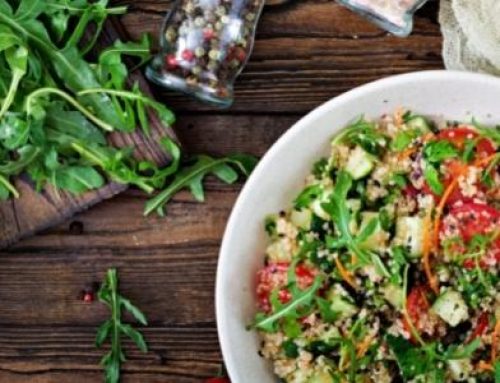 Remember the saying “the straw that broke the camel’s back”? Well if you’re like most people, you’re the camel, carrying a big ol’ load of stress filled straw on your back.
Remember the saying “the straw that broke the camel’s back”? Well if you’re like most people, you’re the camel, carrying a big ol’ load of stress filled straw on your back.
Think about all the things in your current life that are causing you stress. Work deadlines, financial issues, car troubles, relationships, health, high-intensity exercise, forty degree heat, the weird smell in your car or an exorbitantly high phone bill. The list could stretch on.
If we were to add to the top of our mountain of ‘stress straw’ nutrition-related stressors, for many, it can become too much. It can be the proverbial straw that broke the camel’s back. It’s at this point that trying to make the “healthy” choice is replaced by the fast, simple, convenient alternative, which also tends to be highly palatable, energy-dense fast-food.
The above is an acute effect of daily stress but what a lot of people tend to underestimate is the chronic effects of stress on our eating behaviours and health.
Several large studies have now shown that people with higher stress levels tend to gain more body fat over time. Chronic stress also tends to shift the distribution of body fat to the abdominal area as visceral fat which is particularly harmful to our health.
On top of this, increased stress can impact the brain, suppressing the effects of the appetite-regulating hormone leptin, meaning we’re more likely to overeat. What’s worse is that it doesn’t tend to be the simple, whole foods we reach for when stressed but we gravitate towards energy-dense, hyper-palatable “comfort foods”.
Discussing ways to reduce stress in everyday life is beyond the scope of this article, but what we can do is minimise stress around food and nutrition. It’s important to remember that while a lot of the stressors in our lives are outside of our control, nutrition is one aspect that is well and truly within our control. This is important because research indicates that it’s the stressors we feel we don’t have control over that have the highest stress response in the body.
First of all, let’s look at some of the leading causes of nutrition-related stress:
Decreased time availability
One of the biggest sources of stress around nutrition is that we just don’t have time to eat healthily. For the majority of us, as we get older our responsibilities increase, and the amount of free time we have declines. This means preparing healthy options, cooking and planning our intake are usually pushed aside for other aspects of life that may sit higher in our importance hierarchy.
Information overload
The internet is great, no doubt about it. In fact, I laugh out loud daily due to it. But along with the cat videos, gym fails, and lip syncing videos comes an insurmountable amount of information on nutrition. Unfortunately, there is no judge or criteria for what is posted and spread, leading to millions of contrasting articles, theories and blog posts available for the avid reader. The majority of these are poorly researched and offer advice based on nothing more than the writer’s anecdotal experience. Sifting through the chaff and finding actual helpful information becomes particularly hard. Rather than becoming more educated and able to make better decisions, we become confused, frustrated and eventually disinterested.
Decision fatigue
Every day, each of us makes thousands of decisions, most subconsciously. Over the course of a day, as our energy reserves start to deplete we suffer from decision fatigue.
Decision fatigue can impair our ability to weigh up the pros and cons of a decision, leads to increased impulsivity and reduces self-control. All of which work against us when it comes to making smart food choices. Poor food choices can then lead to stress post-consumption when many individuals feel guilt, anxiety and stress.
Fortunately, as previously mentioned, there’s a number of ways we can regain control and help reduce stress around food and nutrition.
My top 7 tips for reducing stress around food are:
1. Embrace simplicity
While nutrition can be complex, eating a healthy diet shouldn’t be. It’s the foundations that will make up 80% of your results. Before you worry about particular nutrients, supplements, timing, organic vs. conventional, sugar, gluten, etc. ensure that you have the foundations in place. Is your energy intake conducive to your goals? Is the majority of your intake coming from whole, minimally processed foods? Are you consuming a wide variety of vegetables and getting sufficient amounts of high quality protein? Stop spending so much time worrying about the minute details and focus on the big, high ROI foundations and I promise you’ll reduce stress and improve the sustainability of your diet.
2. Plan and get organised
Ever had a crazy weekend full of events only to realise late Sunday night or Monday morning that you have no idea what you’re going to eat this week?
Lack of planning and preparation for the working adult automatically places you at a disadvantage. Remember ‘lack of time’ and ‘decision fatigue’ in our list of stress inducing culprits? Both are significantly reduced with a bit of planning and structure. Schedule some time each week to think about the week ahead, taking into consideration what nights you’ll be particularly busy (more likely to be stressed). Design your meal plan based on your week and then create your shopping list. Just knowing what you’re eating and that you have the ingredients reduces a lot of the stress and friction around healthy meals.
3. Clean up your food environment
Cleaning up your food environment is more to do with reducing the stress and anxiety that comes with making poor decisions. No, I’m not talking about wiping down your benches or mopping the kitchen floor (although that’s a good idea too), I’m referring to adjusting the environments in which you frequently spend time or eat.
Tempting food cues in your personal environments are powerful drivers of overeating due to our brain’s hard-wired motivation circuits. Ever left a pack of Tim Tam’s on the kitchen counter? I guarantee you they will be eaten no matter how strong your willpower is.
Fortunately, there is a simple solution: reduce your exposure to food cues. Minimise the amount of tempting, energy dense foods in your home and work environment, particularly those that are readily visible and easy to snack on. The goal is to create a ‘food environment’ that’s conducive to your goals, rather than one that works against them.
4. Have fail-safe meal options
No matter how well planned and organised you may be, life rarely plays out the way we expect it. Again, this comes back to control. Often external events can throw off our plan and make us feel out of control. Cue increased cortisol levels. In situations like this, it can be hugely beneficial to have a backup plan. Simple, healthy meals, which require little preparation are the name of the game here. Microwave steam rice packets, frozen vegetables, tinned tuna or salmon, mixed salad bags, rotisserie chickens. These are all quick, convenient options that can be healthy and still taste good. Another option is pre-prepared frozen meals that can be defrosted and heated quickly.
5. Pick the low hanging fruit
When looking to make a sustainable change to your nutrition, you must consider the overall impact it’s going to have on your life. Too often I see individuals make drastic changes to their lifestyles from the onset of a diet. Most of the time this increases the stress placed on us as we battle to maintain these unrealistic rules/strategies/goals. Rather than making large changes, look at making easy modifications. Before cutting out all carbs maybe try reducing your portions of starchy carbs and increasing your consumption of fibrous vegetables. Rather than going cold turkey on your favourite chai lattes, maybe reduce your intake from 3 large lattes to 1 small. These are examples of easy-to-implement changes that can provide significant results.
6. Not expecting perfection
One of the biggest reasons people stress themselves out when it comes to healthy eating or diets is that they tend to approach it with an all or nothing mindset. They’re either on a diet or off the diet, 100% clean or binge eating on junk. Trying to get EVERYTHING right 100% of the time is a recipe for stress and failure. Not only does it place more stress on you, but it’s completely unnecessary for results. This pressure of perfection often leads to over restriction which in turn drives increased cravings and binges. Which brings me to my next point.
7. Keep in mind the big picture
I see a lot of stress and anxiety around eating so-called “junk”, “bad” or “dirty” foods. Typically, this goes hand in hand with the above. The thing to remember is that one meal, hell even one day of bad food choices isn’t going to lead to substantial fat gain or ill health. What’s more likely to have adverse effects is the guilt, stress and anxiety you feel after consuming something you view as “bad”. If you consume something that isn’t conducive to your goals, that’s fine. Move on and focus on making the next meal one that is. Remember when your mum used to tell you there’s no use crying over spilt milk? The same theory applies here. Feeling guilty, stressed or beating yourself up over something that’s already happened offers no benefits.
Ask yourself: “What’s the one thing I could do right now to feel better about my nutrition?”
Do it.
These are just a small number of ways in which we can reduce some of the common themes around nutrition that I see frequently. Chronic, uncontrolled stress has a ton of adverse effects in the body, many of which can impact our health, food consumption and body composition. By reducing the food related factors that contribute to your overall stress levels, we can at least take some of those straws off your back. I highly recommend chasing relaxation and trying to find some time to de-stress. As they say, “the best time to relax is when you don’t have time for it”.
We can help you with a wide variety of nutrition topics and love seeing clients succeed.
If you’d like further help with your nutrition please click below:





